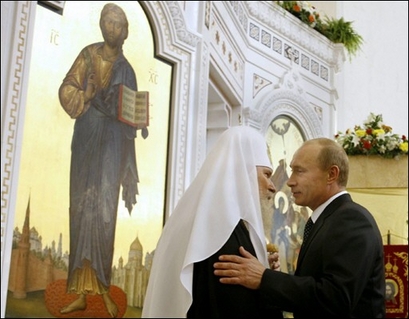The problems concerning the real estate of the Russian Orthodox Autonomous Church (ROAC) is an illustration of that part of the document where support for religious organizations that enjoy a “privileged” status by the government will be realized by the control of property.
“The main form of material assistance for religious organizations on the part of the government remains the manipulation of their real estate. There are cases where properties have been rezoned, evoking apprehension from smaller religious organizations. For example, over the past year in the Vladimir region, there have been several inspections of the properties belonging to the Russian Orthodox Autonomous Church (ROAC). In January, agents of the Vladimir Regional Bureau of the FSB, without informing the leaders of the ROAC, and without stating their reasons, removed approximately 20 files containing documents proving the ownership of this religious organization of a whole list of churches in the region. In the ROAC they are pointing to the clergy of the Russian Orthodox Church (Moscow Patriarchate) who have been saying that soon there will begin a gradual confiscation of the churches of the ROAC so that they can be handed over to the Moscow Patriarchate.”
Three recently passed laws pertain directly to religious organizations. On October 20th, after it failed to pass the first two times that it was submitted, the Duma passed a law changing the criteria of the tax code concerning the production of religious items. On November 7th, the president signed the bill into law. The corrections adopted exempt not only religious organizations that produce religious literature and objects of religious significance from having to pay a Value Added Tax, but also religious organizations that sell these items. This will lead to either a lower cost of production for religious items, a higher profit margin for religious organizations, or both.
Religious organizations are also affected by amendments to the laws governing non-profit organizations, which took effect in April. The biggest cause for concern for the majority of non-profit organizations, including religious organizations, is the complexity of the accounting requirements that was introduced by the government together with these amendments. Not every local religious organization (and even more-so, not every non-profit organization) is capable of complying with the sheer volume of information required (the deadline for filing is in April). The forms call for rather detailed information about “production measures”, and detailed accounting of accounts receivable and accounts payable, especially for amounts “received from international and foreign organizations, foreign citizens, and stateless persons”. It is obvious to everyone that religious organizations cannot possibly account either for the source of donations received anonymously or for the quantity of people present at religious services. The inability to make a full accounting on the forms in a manner satisfactory to the Russian IRS, may lead to legal proceedings liquidating the organizations.
 “In the near future, we expect to start seeing a gradual confiscation of ROAC churches and their transfer to the Moscow Patriarchate,” affirm Alexander Verkhovsky and Olga Sibireva, authors of a lecture entitled “Problems Concerning the achievement of Freedom of Conscience in Russia in 2006”. The lecture, prepared by the informational/analytical center “SOVA”, was delivered in Moscow on March 22nd.
“In the near future, we expect to start seeing a gradual confiscation of ROAC churches and their transfer to the Moscow Patriarchate,” affirm Alexander Verkhovsky and Olga Sibireva, authors of a lecture entitled “Problems Concerning the achievement of Freedom of Conscience in Russia in 2006”. The lecture, prepared by the informational/analytical center “SOVA”, was delivered in Moscow on March 22nd.